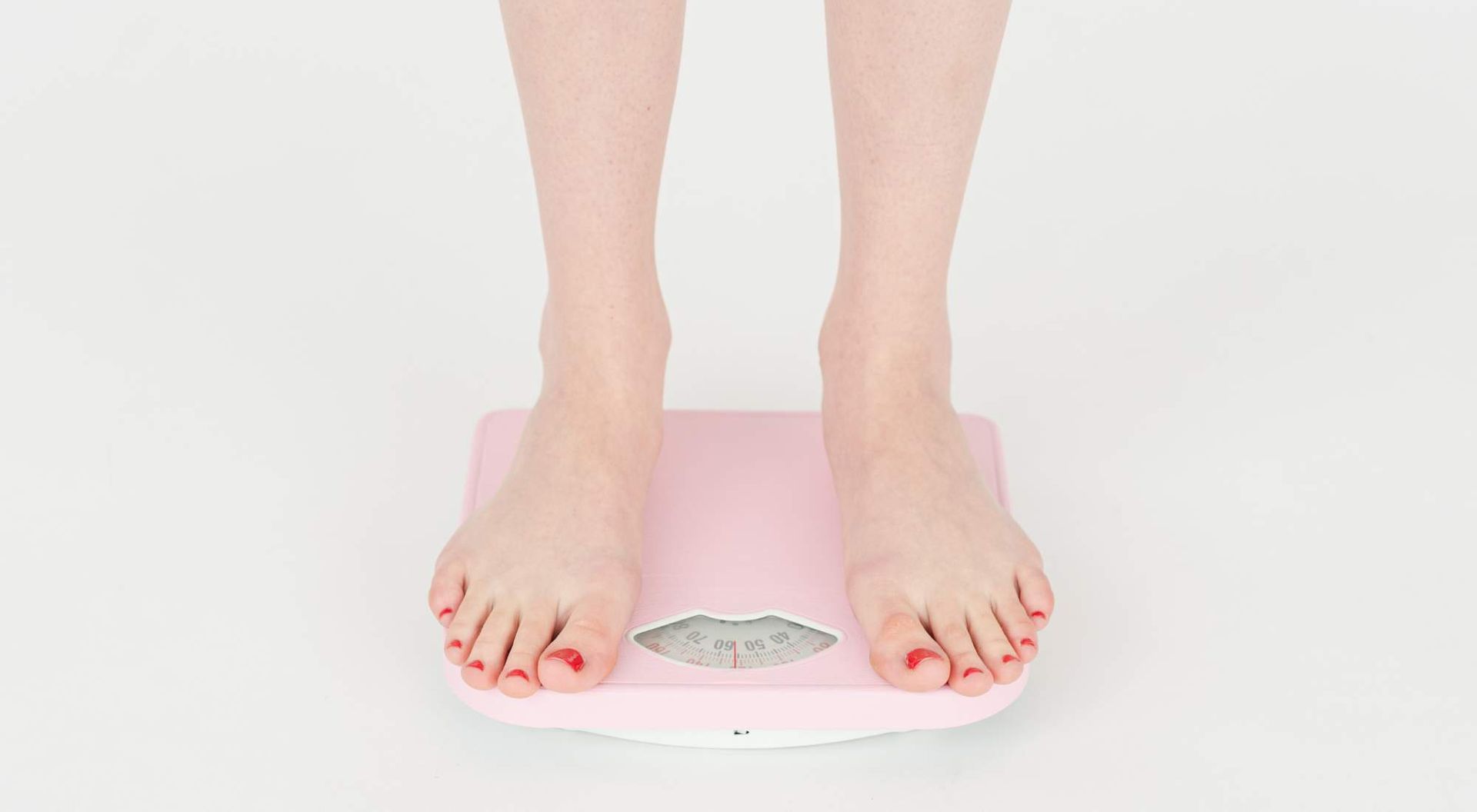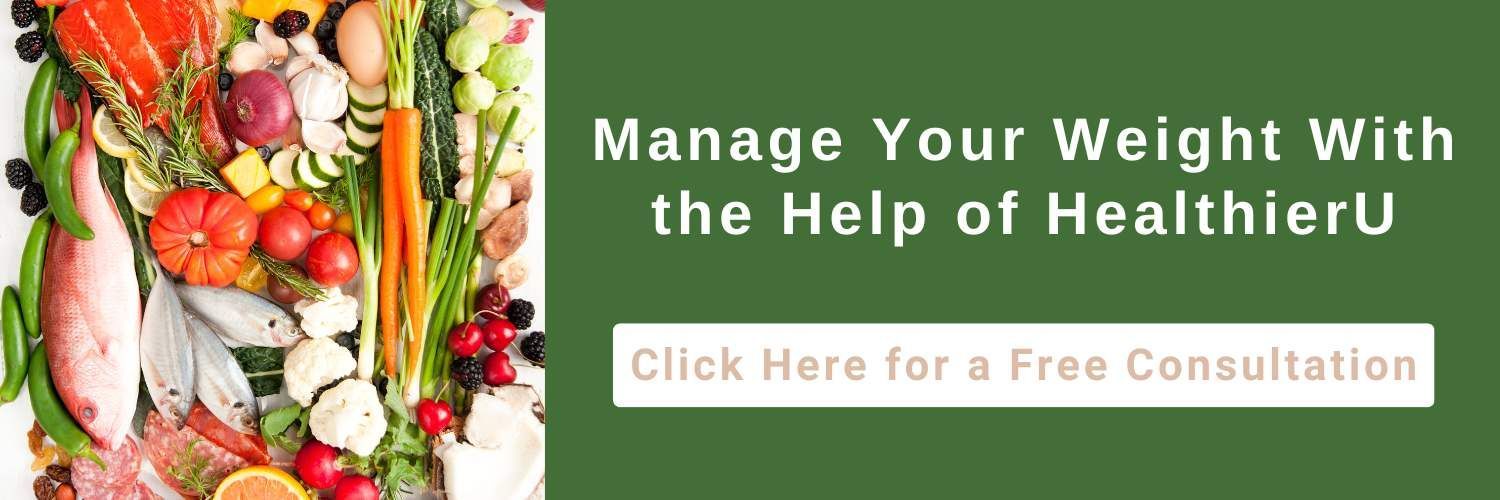Get the Skinny on Period Weight Gain
"The content below is not intended to be a substitute for professional medical advice, diagnosis, or treatment. Always seek the advice of your physician or other qualified health provider with any questions you may have regarding a medical condition."
Aunt Flo always packs a variety of ‘treasures’ for her monthly visits.
There are the mood swings, pimply breakouts, and cramps that feel like a vise is gripping your uterus.
But when you're so bloated you can't fit into your favorite outfit for a night out, it's time to draw the line.
What’s up with the extra pounds your menstrual cycle brings each month? Is this normal? Do you gain weight on your period? And what can you do to feel like yourself again?
We’ve got the answers you're looking for.
Keep reading to find out if period weight gain is normal, why you gain weight on your period, and what you can do to feel normal again.
Table of Contents
- Do You Gain Weight on Your Period?
- How Much Weight Do You Gain When on Your Period?
- Period ‘Weight Gain’ vs. Bloating
- Why Do You Gain Weight on Your Period? 4 Reasons You May See a Slight Increase on the Scale
- How To Manage Period-Related Weight Gain
- HealthierU: Develop a Unique Nutrition Plan That Will Help Your Body Transition Through Your Monthly Cycle With Minimal Weight Gain
Do You Gain Weight on Your Period?
Not every woman gains weight during that time of the month, but many do. In fact, gaining weight on your period is actually quite common.
And the symptoms of
premenstrual syndrome (PMS) can begin before your period even starts, so weight gain may occur before your period even makes its entrance.
How Much Weight Do You Gain When on Your Period?
While no two bodies are alike, during your period it is normal — and common — to gain anywhere between two and six pounds.
You may find your clothes getting a little tighter around your tummy, arms, legs, and breasts. But the good news is that this period weight gain is usually caused by water retention and typically disappears after a few days of bleeding.
If you're regularly experiencing rapid weight gain during that time of the month, we recommend that you speak with your healthcare provider to determine if there are any other issues at play besides your period.
Period ‘Weight Gain’ vs. Bloating
Here’s the deal.
For most women, when you gain weight on your period, you're not gaining actual fat. Most of it is just water weight — a.k.a. bloating. But this bloating can add extra weight.
You know the feeling. You can't zip your jeans, you're spilling out of your bra, and your rings feel tight and uncomfortable on your fingers.
In general, the important thing to remember is that any period ‘weight gain’ (or bloating) usually goes away by day three to five of your period.
If you’re suffering from weight gain on your period,
HealthierU can help. Contact us today for a free consultation and learn more about why you gain weight on your period and what you can do about it.
Why Do You Gain Weight on Your Period? 4 Reasons You May See a Slight Increase on the Scale
Now that we know that gaining a few pounds around the time of your period is normal, let's take a look at four reasons why you gain weight on your period:
- Fluctuating hormones, including estrogen and progesterone
- Changes in your eating habits
- Less exercise; and
- Gastrointestinal issues
#1: Hormonal Fluctuations
Female hormones are complex and powerful — just like the amazing humans they inhabit — and are key players in period weight gain.
Throughout your menstrual cycle, your hormones are constantly fluctuating and affecting every function of your body, including:
- Water retention
- Appetite
- Bowel movements
- Skin (those nasty monthly breakouts)
- And more
Your estrogen levels peak during the end of your menstrual cycle in the days right before your period starts. These elevated levels can cause your body to retain fluid, making you feel bloated and potentially causing you to put on a few extra pounds of water weight.
Progesterone levels in your body also spike during the second half of your cycle and can lead to the possibility of water retention.
#2: Changes in Eating Habits
Ever gone on an ice cream binge or scarfed down a whole bag of chips in one sitting? We’ve all been there.
For some women, an approaching period can wreak havoc on their eating habits and result in:
- Overeating
- Powerful cravings
- Snacking; or
- Eating foods they normally avoid or limit
Back to those hormones. The boost in progesterone levels as your period is approaching can ramp up your appetite, and you may find yourself experiencing cravings and eating more than you do during the rest of the month.
If you're like most women, those cravings don’t leave you hungry for a big green salad.
Instead, they drive you to go after all things sweet and salty — pizza and donuts, anyone? — which, of course, can make the scale jump.
Left unchecked, those extra calories can lead to extra pounds that can potentially stick around even after your period is over.
Fatigue
Fatigue during the days surrounding your period can also trigger a change in your eating habits.
For starters, you may feel stressed or overly tired and not feel like putting together a nutritious meal.
Or you may have low energy and decide to load up on caffeinated beverages to try to get a little extra boost.
The problem is, most beverages with caffeine do nothing to hydrate your body and are filled with tons of added sugars or artificial sweeteners — both of which are no-nos if you want to keep
bloating at bay.
Decrease in Magnesium
The mineral magnesium is essential to keep your body's hydration levels stabilized.
But maintaining the correct balance of magnesium can be tricky since your
magnesium levels drop once your period begins. And this decrease in magnesium can pave the way for sugar cravings — which can lead to weight gain.
#3: Less Exercise
As we mentioned earlier, in the week before your period starts, your hormone levels — particularly your estrogen and progesterone levels — increase.
You might feel much more fatigued than usual and suffer from lower-than-normal endurance. Add in any excess bloating, and your motivation to hit the gym may hit rock bottom.
#4: Gastrointestinal Distress
Changes in your diet coupled with the build-up of progesterone in your body can reduce the pace of your normally active digestive system to a slow trudge.
Progesterone levels rise in your body in the days right before your cycle starts. This rise causes your body’s smooth muscles to relax and slows down the spasms in your gastrointestinal tract that are required to poop.
If you’re not proactive about keeping your system running smoothly, you may find your bowels to be backed up and bloated just before and during your period.
How To Manage Period-Related Weight Gain
Honestly, sometimes period weight gain is just unavoidable. But that doesn't mean you should throw in the towel and give up.
There are some things you can do to try to alleviate the inevitable monthly bloating you experience.
Here are our top suggestions for keeping your body feeling as normal as possible:
- Avoid overeating
- Stick with your regular exercise routine
- Keep your body hydrated
- Up your intake of magnesium
- Stay away from salt
- Eat more citrus foods
Avoid Overeating
Hormonal changes during your period can play a role in creating a tendency to overeat during your cycle.
Just a week before your period, progesterone levels in the body begin to rise. Progesterone is an appetite stimulant and a rise in progesterone levels can make you feel more hungry than you actually are, resulting in overeating.
Estrogen can also play a role in overeating, as it helps regulate serotonin — a neurotransmitter that reduces appetite. Just before your period, estrogen levels in the body drop, resulting in a drop of serotonin. This can lead to sugar and high carbohydrate cravings that can result in weight gain.
So, how do you beat overeating with the odds stacked against you? Knowledge is your armor.
Be aware of your food intake and try to resist caving into cravings that may lead to weight gain.
Continue Your Regular Exercise Routine
We get it. Feeling fatigued, foggy, and crampy can leave even the toughest woman feeling less than motivated to hit the gym or maintain her normal exercise routine.
But doing your best to push through monthly discomfort can go a long way in managing any period-related weight gain.
Working up a good sweat can help you shed that excess water weight. And ramping up your endorphins can be just what your body needs to squelch those nasty cramps and boost your overall state of mind.
Stay Hydrated
Hydrate, hydrate, hydrate.
We hear it all the time, but drinking lots of water can be especially helpful in avoiding period weight gain during that time of the month.
One study determined that drinking at least seven to eight cups of water daily can help alleviate uncomfortable period symptoms.
And while it may seem counterintuitive, keeping your body hydrated actually helps fight fluid retention and keeps your bowels moving smoothly.
Increase Your Magnesium Intake and Decrease Your Salt Intake
Magnesium can help decrease pre-period bloating since it contributes to the production of normal stomach acid.
To up your magnesium, try taking it as a supplement or add more magnesium-rich foods to your diet, like:
- Spinach and other green leafy veggies
- Almonds
- Oats
- Chia seeds
- Pumpkin seeds; or
- Bananas
It can also be a great idea to cut back on your salt consumption. Since salt attracts water, eating too much of it can contribute to unwanted fluid retention.
Add More Citrus Fruit to Your Diet
Increasing your citrus intake is a tasty option for managing monthly period weight gain. Citrus foods are packed full of fiber (to keep your bowels moving at a regular pace) and vitamin C (a natural diuretic), both of which help reduce bloating.
In the days leading up to your period, try getting more of these foods into your diet:
- Oranges
- Lemons
- Limes; and
- Tangerines
HealthierU: Develop a Unique Nutrition Plan That Will Help Your Body Transition Through Your Monthly Cycle With Minimal Weight Gain
If you're ready to get period weight gain under control, we would love to help.
At HealthierU, we specialize in supporting your body naturally, during your period and all month long, so your cycle can be more pleasant.
We’ll start by performing Nutrition Response Testing to help determine where your body is — and isn’t — balanced.
From there, we’ll pinpoint the cause of any imbalance and create your own custom-designed program that combines …
- Nutrition
- Supplementation; and
- Lifestyle recommendations
… to help you navigate your monthly cycle and avoid excess period weight gain.
Contact us today to schedule your consultation.






